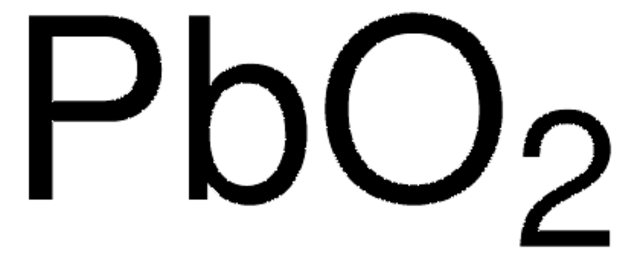254258
Lead(II) sulfate
99.995% trace metals basis
Sinonimo/i:
Anglesite
About This Item
Prodotti consigliati
Saggio
99.995% trace metals basis
Forma fisica
powder and chunks
Impiego in reazioni chimiche
reagent type: catalyst
core: lead
Impurezze
≤55.0 ppm Trace Metal Analysis
Densità
6.2 g/mL at 25 °C (lit.)
Stringa SMILE
[PbH2++].[O-]S([O-])(=O)=O
InChI
1S/H2O4S.Pb/c1-5(2,3)4;/h(H2,1,2,3,4);/q;+2/p-2
KEQXNNJHMWSZHK-UHFFFAOYSA-L
Cerchi prodotti simili? Visita Guida al confronto tra prodotti
Applicazioni
- Lead(II) sulfate uses.: Widely recognized for its role in lead-acid battery technology, Lead(II) sulfate is pivotal in the production of battery plates. It contributes to the battery′s ability to store and release energy efficiently, which is critical in automotive and renewable energy storage applications (DOI: 10.1039/d3ra04386j).
Avvertenze
Danger
Indicazioni di pericolo
Consigli di prudenza
Classi di pericolo
Acute Tox. 4 Inhalation - Acute Tox. 4 Oral - Aquatic Acute 1 - Aquatic Chronic 1 - Repr. 1A - STOT RE 2
Codice della classe di stoccaggio
6.1C - Combustible acute toxic Cat.3 / toxic compounds or compounds which causing chronic effects
Classe di pericolosità dell'acqua (WGK)
WGK 3
Punto d’infiammabilità (°F)
Not applicable
Punto d’infiammabilità (°C)
Not applicable
Dispositivi di protezione individuale
dust mask type N95 (US), Eyeshields, Gloves, type P2 (EN 143) respirator cartridges
Scegli una delle versioni più recenti:
Possiedi già questo prodotto?
I documenti relativi ai prodotti acquistati recentemente sono disponibili nell’Archivio dei documenti.
I clienti hanno visto anche
Articoli
Since the first report of the low-cost dye-sensitized solar cell (DSSC) in 1991 by Gratzel and his coworker,1 dye-sensitized solar cells (DSSC) has been regarded as one of the most promising photovoltaic technologies because of their transparent and colorful characteristics, as well as low cost.
Colloidal quantum dots (CQDs) are semiconducting crystals of only a few nanometers (ca. 2–12 nm) coated with ligand/surfactant molecules to help prevent agglomeration.
Il team dei nostri ricercatori vanta grande esperienza in tutte le aree della ricerca quali Life Science, scienza dei materiali, sintesi chimica, cromatografia, discipline analitiche, ecc..
Contatta l'Assistenza Tecnica.















